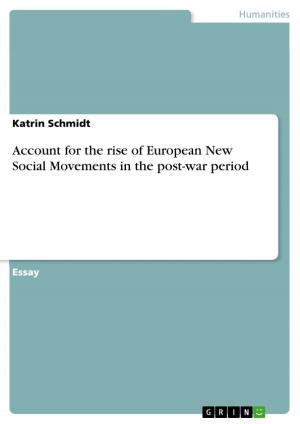Jean Jaques Rousseau's Concept of Society and Government: A Study of the Social Contract
Nonfiction, Social & Cultural Studies, Political Science, Politics, History & Theory| Author: | Andrea Becker, Maren Reyelt | ISBN: | 9783638292009 |
| Publisher: | GRIN Publishing | Publication: | July 15, 2004 |
| Imprint: | GRIN Publishing | Language: | English |
| Author: | Andrea Becker, Maren Reyelt |
| ISBN: | 9783638292009 |
| Publisher: | GRIN Publishing |
| Publication: | July 15, 2004 |
| Imprint: | GRIN Publishing |
| Language: | English |
Seminar paper from the year 2001 in the subject Politics - Political Theory and the History of Ideas Journal, grade: 1 - (A-), University of Wyoming (Department of Political Science), course: Recent Political Thought, language: English, abstract: 'Man is born free and, and everywhere he is in chains. One believes himself the other's master, and yet is more a slave than they. How did this change come about? I do not know. What can it make legitimate? I believe I can solve this.'1 Regarding this quoted statement, Jean-Jacques Rousseau's Of the Social Contract or Principles of Political Right (in the following referred to as the Social Contract) of 1762 tries to explain and solve the problems of the society Rousseau lived in with the idea of a somewhat direct democracy and a radical popular sovereignty. Accordingly, the author's theory is the counterpart to the early liberal Montesquieuian model of a state with a binding constitution, but also to the later classical liberal theories of democracy of John Stuart Mill. In general, Rousseau is known as a representative of the concept of direct democracy and as an intercessor of the identity of governors and the governed. Moreover, he pledged for the inseparability of popular sovereignty. 2 Taking this into consideration, Rousseau's Social Contract - although censored and prohibited in his own time - remains a key source of democratic belief and is one of the classics of political theory. His theories were viewed so controversially that they were even publicly burned. So, the Social Contract and Emile or on Education (1762) became victims of the flames.3 This was, because basically, the Social Contract argues, that 'the first and the most important consequences of the principles established so far is that the general will [volonté générale] alone can direct the forces of the state according to the end of its institution, which is the common good.'4 1 Jean-Jacques Rousseau: The Social Contract and Other Later Political Writings, edited and translated by Victor Gourevitch, Cambridge: Cambridge University Press (Cambridge Texts in the History of Political Thought), 1997, Book I, p. 41. 2 Manfred G. Schmidt: Demokratietheorien. Eine Einführung, 2. Auflage, Opladen: Leske + Budrich, 1997, pp. 23-24. 3 Merle L. Perkins: Jean-Jacques Rousseau on the Individual and Society, Lexington: University Press of Kentucky, 1974, p. 239. 4 Rousseau: The Social Contract, Book II, p. 57.
Seminar paper from the year 2001 in the subject Politics - Political Theory and the History of Ideas Journal, grade: 1 - (A-), University of Wyoming (Department of Political Science), course: Recent Political Thought, language: English, abstract: 'Man is born free and, and everywhere he is in chains. One believes himself the other's master, and yet is more a slave than they. How did this change come about? I do not know. What can it make legitimate? I believe I can solve this.'1 Regarding this quoted statement, Jean-Jacques Rousseau's Of the Social Contract or Principles of Political Right (in the following referred to as the Social Contract) of 1762 tries to explain and solve the problems of the society Rousseau lived in with the idea of a somewhat direct democracy and a radical popular sovereignty. Accordingly, the author's theory is the counterpart to the early liberal Montesquieuian model of a state with a binding constitution, but also to the later classical liberal theories of democracy of John Stuart Mill. In general, Rousseau is known as a representative of the concept of direct democracy and as an intercessor of the identity of governors and the governed. Moreover, he pledged for the inseparability of popular sovereignty. 2 Taking this into consideration, Rousseau's Social Contract - although censored and prohibited in his own time - remains a key source of democratic belief and is one of the classics of political theory. His theories were viewed so controversially that they were even publicly burned. So, the Social Contract and Emile or on Education (1762) became victims of the flames.3 This was, because basically, the Social Contract argues, that 'the first and the most important consequences of the principles established so far is that the general will [volonté générale] alone can direct the forces of the state according to the end of its institution, which is the common good.'4 1 Jean-Jacques Rousseau: The Social Contract and Other Later Political Writings, edited and translated by Victor Gourevitch, Cambridge: Cambridge University Press (Cambridge Texts in the History of Political Thought), 1997, Book I, p. 41. 2 Manfred G. Schmidt: Demokratietheorien. Eine Einführung, 2. Auflage, Opladen: Leske + Budrich, 1997, pp. 23-24. 3 Merle L. Perkins: Jean-Jacques Rousseau on the Individual and Society, Lexington: University Press of Kentucky, 1974, p. 239. 4 Rousseau: The Social Contract, Book II, p. 57.















